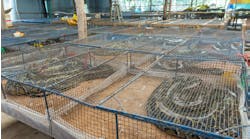What’s Jeff Bezos doing with all that money? He just made a $60 million initial commitment to establish Bezos Centers for Sustainable Protein.
The world’s richest man (net worth of about $200 billion), founder of Amazon and acquirer of Whole Foods Market is a big philanthropist. In early 2020 he put up $1 billion (with a commitment to hit $10 billion) to create the Bezos Earth Fund with a goal to transform the world’s food systems. The Centers for Sustainable Protein is a part of the Earth Fund.
“The centers will target major technological barriers to reducing cost, increasing quality and boosting nutritional benefit of alternative proteins by advancing science and technology,” an announcement on the Earth Fund website explained. “To date, challenges in biomanufacturing – the production, at scale, of sustainable protein products, whether plant based, fermented, or cultivated – are resulting in high costs and limited quality. There are also enormous opportunities to enhance the texture and boost flavor through innovation in cell biology and engineering.”
“We need to feed 10 billion people with healthy, sustainable food throughout this century while protecting our planet,” Lauren Sánchez, vice chair of the Earth Fund, said in announcing the protein centers. “We can do it, and it will require a ton of innovation.”
The Bezos Earth Fund works to support farmers and expand food production in a sustainable manner. Work includes reducing methane from livestock and innovating in pasture management to help take pressure off forested land. The Earth Fund is also working with inventors, researchers and entrepreneurs to improve the resilience and carbon absorption of major food crops.
“Food is the second largest cause of climate change, and agriculture is the primary driver of deforestation and biodiversity loss,” the Sustainable Protein announcement continued. “Making the food system more sustainable requires changing the way we produce and consume food. Given population and income growth, by 2050 food consumption is expected to rise by 50%, while emissions from food will need to fall by 60% and pressure on vital forest systems will need to be reduced. New ideas, technologies, and behaviors can make this possible.”
Details were lacking on just how and on what the Bezos Centers for Sustainable Protein will spend its funding.



